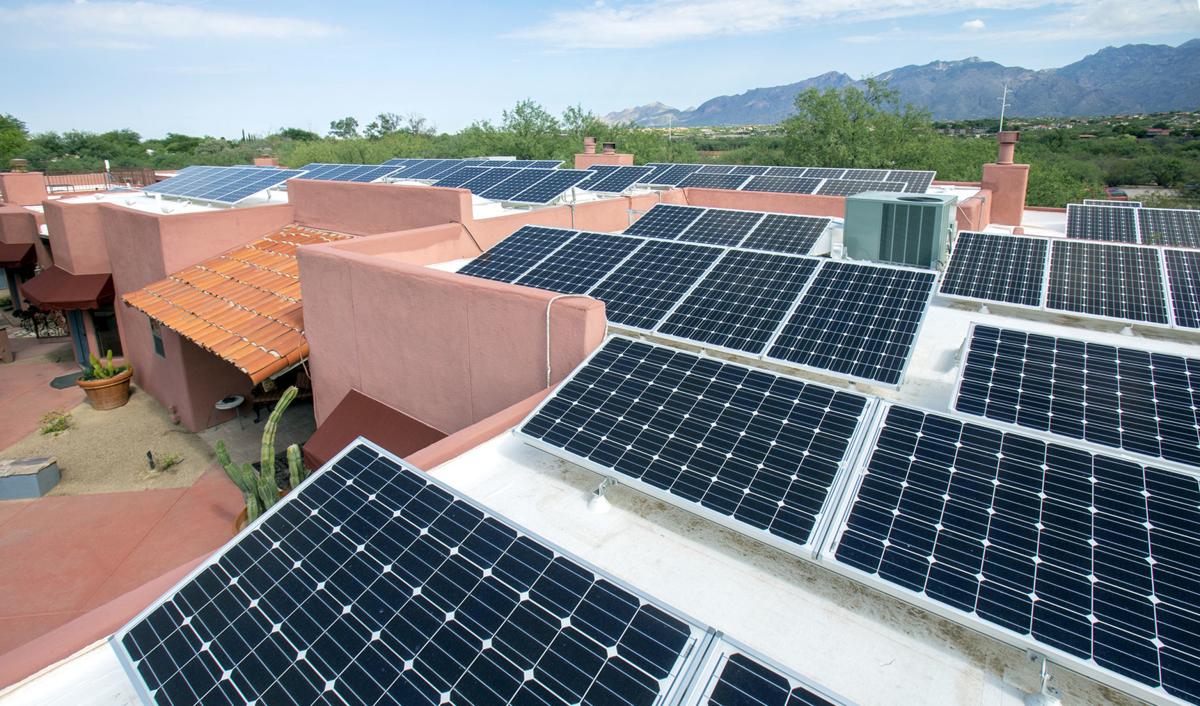An administrative judge mulling Tucson Electric Power Co.’s treatment of future rooftop-solar customers has backed a new reimbursement rate for excess solar energy production close to what TEP requested, spurning a higher rate pushed by solar advocates.
And though the judge also backed a new monthly meter fee for solar customers, she rejected the utility’s rate-design proposals — including a new solar “grid-access charge” — ruling the plans were based on flawed cost studies.
In a much-anticipated recommendation filed Thursday, Arizona Corporation Commission chief administrative law judge Jane Rodda proposed a TEP solar-energy export rate of 9.64 cents per kilowatt hour, compared with the retail rate of 11.5 cents current rooftop-solar customers receive.
For UES Electric, TEP’s sister rural utility that serves Santa Cruz and Mohave counties, Rodda recommended an export rate of 11.5 cents per kilowatt hour compared with the rural utility’s 2016 average rate of 10.8 cents.
In a unified proceeding for TEP and UES Electric, TEP proposed a short-term rate of 10.7 cents for both utilities that would be reset on July 1 to 9.63 cents for TEP and 9.2 cents for UES.
Regulators are considering new rules and rates for new rooftop-solar customers after deciding in December 2016 to phase out so-called net metering, whereby solar customers are credited for their excess energy production at a full retail rate.
The new rules will not affect customers who already have solar systems installed or those who apply to connect their solar panels before the Corporation Commission rules on the new rates, which could happen at the panel’s next scheduled open meeting on April 26.
The commission can accept, reject or modify the administrative law judge’s recommended order, but such recommendations typically carry significant weight.
Under last year’s solar policy ruling, the commission ordered that new “solar export rates” for TEP and other utilities with pending rate cases initially be set based on a five-year average cost of power purchases from utility-scale solar farms.
The commission granted TEP a general rate increase in February 2017, raising the average household bill by about $8.50 per month, but solar rate issues were deferred to a separate proceeding.
Following the commission’s general solar policy, Rodda’s ruling calls for the initial export rates to be reset in future rate cases based on a five-year rolling average of utility-scale solar generation cost, with annual decreases capped at 10 percent. The rate for each customer would be locked in for 10 years at the prevailing rate when their system was connected.
Solar-industry groups have argued for solar export rates starting at 12 cents per kWh, including additions to reflect savings on transmission and distribution, such as reduced line losses, from local solar installations.
Rodda also recommended approval of a new monthly meter fee of $2.33 for residential customers who install solar and 90 cents per month for small-business solar customers, though TEP initially wanted residential fees of more than $4.
In the first phase of TEP’s rate case, regulators approved a monthly meter fee of $2.05 for new residential solar customers and 35 cents monthly for small-business customers.
But Rodda rejected new solar rate plans filed by both TEP and UES, ruling they were based on so-called “class cost of service studies” that she said unfairly calculated a key measure of peak demand.
As part of its plan, TEP also sought to impose a monthly “grid access fee” of $3.50 per kilowatt (DC) of each solar system’s capacity — about $25 a month for a typical 7-kW capacity system — but indicated it would accept a $2.50 monthly fee proposed by commission staff.
Arizona Public Service Co., the state’s largest utility, charges a grid-access fee of 93 cents per kilowatt of capacity.
Rodda’s ruling would prevent TEP and UES from adopting new rate plans, including the new grid-access fee, until the companies file new customer-class cost studies to allow regulators to determine whether the rates are fair. Until then, Rodda said, new solar customers should be allowed to pick among any of the time-of-use rates approved last year in the first phase of TEP’s general rate case.
TEP spokesman Joe Barrios would not comment on the judge’s order, saying company officials were still studying the document.





